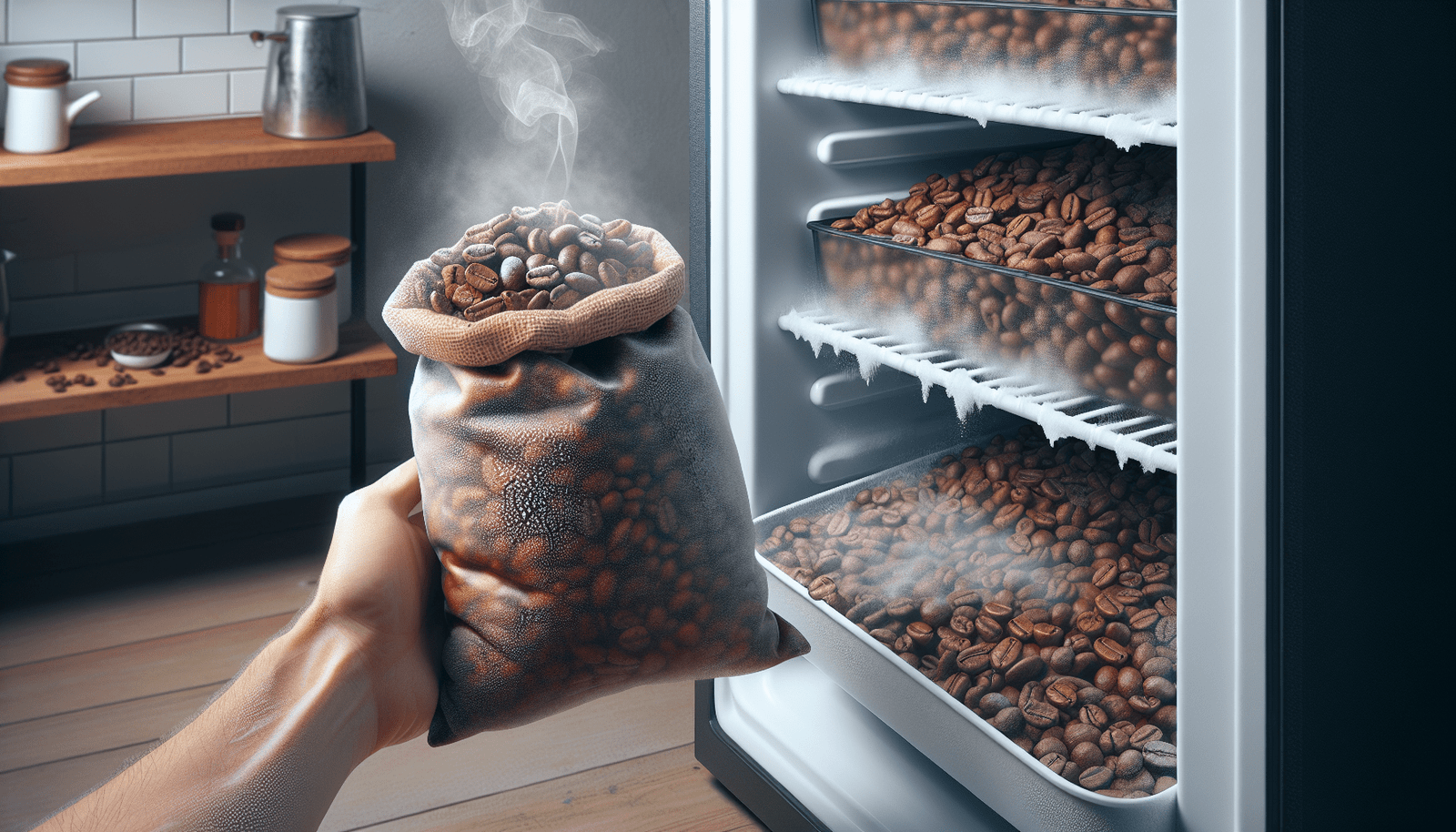If you’re a coffee lover, you know that the journey of exploring different coffee beans is a truly delightful one. From the rich flavors of espresso beans to the unique taste of chocolate-covered coffee beans, there is so much to discover. But have you ever wondered about the best way to store your coffee beans? Well, freezing them might just be the answer. In this article, we will take a closer look at the practice of Freezing Coffee Beans, and why it can be a game-changer for your morning brew. So grab your favorite mug and get ready to dive into the world of frozen coffee beans!

Why Freeze Coffee Beans?
When it comes to preserving the freshness, flavor, and aroma of coffee beans, freezing them can be a game-changer. Freezing coffee beans offers several benefits, including extending their shelf life and maintaining their quality even after long periods of storage. In this article, we will explore the advantages of freezing coffee beans, the best practices for freezing and thawing, and address common misconceptions surrounding this method.
Benefits of Freezing Coffee Beans
Preserving Freshness
Coffee beans are highly susceptible to aging and losing their freshness. By freezing them, you can effectively halt the aging process and retain their freshness for a longer time. This is particularly advantageous if you purchase coffee beans in bulk or receive them as a gift. Freezing the beans ensures that you can enjoy freshly brewed coffee whenever you desire, without worrying about the beans going stale.
Extending Shelf Life
Coffee beans have a limited shelf life, especially once they are exposed to air and moisture. Freezing coffee beans helps to prolong their shelf life by preventing the growth of mold, bacteria, and other contaminants that can affect their quality. By keeping them in a frozen state, you can enjoy great-tasting coffee beans for an extended period.
Maintaining Flavor and Aroma
One of the biggest concerns when it comes to freezing coffee beans is whether it affects their flavor and aroma. However, when done correctly, freezing coffee beans can actually help to maintain these desirable qualities. By storing the beans in a frozen environment, you preserve their natural oils and flavors, ensuring that each cup of coffee is as flavorful and aromatic as the last.
How to Freeze Coffee Beans
Now that we understand the benefits of freezing coffee beans, let’s delve into the process of freezing them.
Selecting the Right Beans for Freezing
Not all coffee beans are suitable for freezing. It is important to choose high-quality, freshly roasted beans that are within their peak freshness period. Look for beans with a roast date that is relatively recent, as this ensures better flavor retention during the freezing process.
Properly Packaging the Beans
To protect the coffee beans from moisture and air, it is crucial to package them properly before freezing. Opt for airtight containers or vacuum-sealed bags to prevent any contact with oxygen. This will help to maintain the flavor and aroma of the beans and ensure that they remain in optimal condition.
Determining the Quantity to Freeze
When deciding how much coffee to freeze, it is best to only freeze the amount that you expect to use within a reasonable time frame. The more times the beans are thawed and refrozen, the more likely they are to lose their flavor and quality. It’s better to freeze smaller portions and replenish your supply as needed.
Choosing the Right Freezing Method
There are a few different methods you can use to freeze coffee beans. The most common approach is to place the beans in an airtight container or bag and store them in the freezer. However, some coffee enthusiasts prefer to pre-portion the beans into individual servings and then freeze them. This allows for precise measurement and reduces the amount of air exposure each time the beans are taken out of the freezer.
Freezing and Thawing Process
Now that your coffee beans are properly packaged and ready for freezing, let’s take a closer look at the step-by-step process of freezing them.
Step-by-Step Guide to Freezing Coffee Beans
- Divide your coffee beans into smaller portions, if desired.
- Place the beans in airtight containers or vacuum-sealed bags, removing as much air as possible.
- Label the containers or bags with the date of freezing.
- Put the containers or bags in the freezer.
- For longer storage, consider placing the containers or bags inside a larger freezer bag for extra protection against freezer burn.
Thawing Coffee Beans for Use
When you’re ready to use your frozen coffee beans, it’s important to thaw them properly to maintain their quality.
- Take the desired amount of frozen coffee beans out of the freezer.
- Let them thaw at room temperature for a few hours or overnight.
- Avoid using heat or microwaves to speed up the thawing process, as this can negatively affect the flavor and aroma of the beans.
- Once thawed, the coffee beans are ready for brewing!

Tips for Freezing Coffee Beans
To ensure the best results when freezing coffee beans, here are some additional tips to keep in mind:
Avoiding Moisture and Air Exposure
Moisture and air are the enemies of freshly roasted coffee beans. Be sure to remove as much air as possible from the packaging before freezing and store the beans in a dry environment. This will help to prevent any unwanted moisture or oxygen from degrading the quality of the beans.
Using Airtight Containers or Vacuum-Sealed Bags
Invest in airtight containers or vacuum-sealed bags specifically designed for storing coffee beans. These containers or bags create a barrier against moisture, air, and other contaminants, keeping the beans fresh and flavorful for longer periods.
Labeling and Dating the Frozen Coffee Beans
When freezing coffee beans, it’s important to label and date them. This will help you keep track of their freshness and ensure that you use the oldest beans first. Simply write the date of freezing on the containers or bags before placing them in the freezer.
Avoiding Repeated Thawing and Refreezing
Repeatedly thawing and refreezing coffee beans can degrade their quality and flavor. To minimize the need for this, freeze coffee beans in smaller portions that align with your brewing needs. This way, you can thaw only the amount you need without exposing the rest of the beans to repeated thawing and refreezing.
Best Practices for Freezing Flavored Coffee Beans
Flavored Coffee Beans require special consideration when it comes to freezing, as their flavors can be more delicate and vulnerable to degradation. Here are some best practices for freezing flavored coffee beans:
Preserving the Flavors of Flavored Coffee Beans
Flavored coffee beans tend to have oils and additives that contribute to their unique flavors. To preserve these flavors during freezing, it is best to use airtight containers or vacuum-sealed bags and follow the same freezing process outlined earlier. This will help to maintain the integrity of the flavors and allow you to enjoy the full experience of flavored coffee.
Packaging Considerations for Flavored Coffee Beans
To prevent flavor cross-contamination, it is advisable to dedicate separate containers or bags for each flavor of coffee beans. This will prevent the flavors from mixing and ensure that each cup of coffee reflects the intended flavor profile. Labeling the containers or bags with the flavor can also help you easily identify the beans you want to brew.
Effect on Caffeine Content
The caffeine content of coffee beans is a significant aspect for many coffee drinkers. It is natural to wonder if freezing coffee beans affects their caffeine levels. Let’s explore this further:
Does Freezing Coffee Beans Affect Caffeine Content?
Freezing coffee beans does not directly impact the caffeine content. The freezing process primarily affects the bean’s flavor and aroma, while the caffeine levels remain relatively stable. You can continue to enjoy your preferred level of caffeine, whether the beans have been frozen or not.
Understanding the Impact of Freezing on Caffeine
While freezing coffee beans does not alter their caffeine content, it is important to note that the way you brew your coffee can affect the extraction of caffeine. Factors such as water temperature, brewing time, and grind size play a more significant role in determining the caffeine strength of your cup of coffee.
Thawing Coffee Beans for Brewing
Once your frozen coffee beans are ready to be brewed, proper thawing is essential to ensure optimal flavor extraction. Let’s explore the ideal thawing time and method:
Ideal Thawing Time and Method
To achieve the best results when thawing coffee beans, it is recommended to let them thaw at room temperature for a few hours or overnight. This gradual thawing process allows the beans to regain their natural moisture without compromising their flavor profile. Avoid using heat or microwaves, as they can lead to uneven thawing and affect the overall quality of the beans.
Preparation Tips Before Brewing
Before brewing your thawed coffee beans, it’s a good idea to inspect them for any signs of freezer burn or deterioration. If the beans appear dry or have a strange odor, it may be best to discard them and use fresher beans instead. Once you are satisfied with the quality of the thawed coffee beans, grind them according to your preferred brewing method and enjoy a delicious cup of freshly brewed coffee.
Freezing Coffee Grounds vs. Whole Beans
When it comes to freezing coffee, you may wonder if it is better to freeze coffee grounds or whole beans. Let’s compare the two approaches:
Is it Better to Freeze Coffee Grounds or Whole Beans?
Both freezing coffee grounds and whole beans can yield satisfactory results, but some differences exist between the two methods. Freezing whole beans is generally preferred because they have a larger surface area that is exposed to oxygen, making them more susceptible to oxidation and flavor deterioration. By freezing whole beans, you can preserve their freshness more effectively.
Different Freezing Approaches for Coffee Grounds
If you prefer freezing coffee grounds, it is important to package them properly to minimize air exposure. Divide the grounds into portions suitable for a single use and place them in airtight containers or bags. This will help to minimize any potential flavor loss and maintain the overall quality of the coffee grounds.
Freezing Coffee Beans: Common Misconceptions
There are several misconceptions surrounding the freezing of coffee beans. It’s time to dispel those myths and explore the truth behind them:
Dispelling Myths about Freezing Coffee Beans
Myth: Freezing coffee beans destroys their flavor. Truth: When coffee beans are frozen and thawed correctly, their flavor can be remarkably well-preserved. The key lies in proper packaging and controlled thawing.
Myth: Coffee beans should never be frozen because they absorb other freezer odors. Truth: Coffee beans are not highly absorbent, and when stored in airtight containers or bags, they are unlikely to absorb freezer odors.
Myth: You can’t achieve the same freshness with frozen coffee beans. Truth: Properly frozen coffee beans can maintain their freshness and quality for a considerable period, allowing coffee lovers to enjoy delicious cups of coffee long after the roast date.
Exploring the Truth Behind Common Misconceptions
It is important to approach freezing coffee beans with the right techniques and understanding. By following the best practices outlined in this article, you can enjoy the full benefits of freezing without falling into the trap of common misconceptions.
Conclusion
Freezing coffee beans can be an excellent way to preserve their freshness, extend their shelf life, and maintain their flavor and aroma. With the right approach and proper packaging, frozen coffee beans can provide a delicious and convenient brewing experience. Experiment with different beans, flavors, and thawing methods to find your preferred approach. By incorporating freezing into your coffee routine, you can ensure that every cup of coffee is as fresh and enjoyable as the last.

